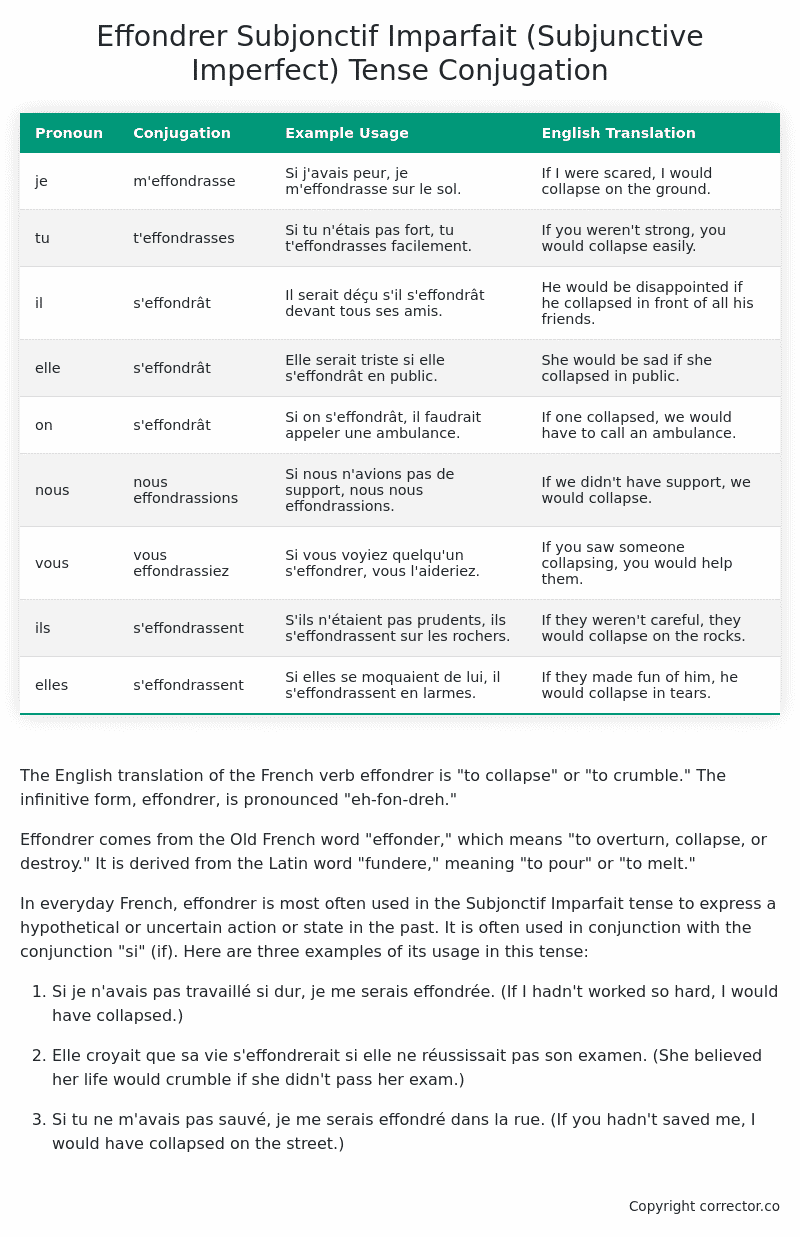Subjonctif Imparfait (Subjunctive Imperfect) Tense Conjugation of the French Verb effondrer
Introduction to the verb effondrer
The English translation of the French verb effondrer is “to collapse” or “to crumble.” The infinitive form, effondrer, is pronounced “eh-fon-dreh.”
Effondrer comes from the Old French word “effonder,” which means “to overturn, collapse, or destroy.” It is derived from the Latin word “fundere,” meaning “to pour” or “to melt.”
In everyday French, effondrer is most often used in the Subjonctif Imparfait tense to express a hypothetical or uncertain action or state in the past. It is often used in conjunction with the conjunction “si” (if). Here are three examples of its usage in this tense:
-
Si je n’avais pas travaillé si dur, je me serais effondrée. (If I hadn’t worked so hard, I would have collapsed.)
-
Elle croyait que sa vie s’effondrerait si elle ne réussissait pas son examen. (She believed her life would crumble if she didn’t pass her exam.)
-
Si tu ne m’avais pas sauvé, je me serais effondré dans la rue. (If you hadn’t saved me, I would have collapsed on the street.)
Table of the Subjonctif Imparfait (Subjunctive Imperfect) Tense Conjugation of effondrer
| Pronoun | Conjugation | Example Usage | English Translation |
|---|---|---|---|
| je | m’effondrasse | Si j’avais peur, je m’effondrasse sur le sol. | If I were scared, I would collapse on the ground. |
| tu | t’effondrasses | Si tu n’étais pas fort, tu t’effondrasses facilement. | If you weren’t strong, you would collapse easily. |
| il | s’effondrât | Il serait déçu s’il s’effondrât devant tous ses amis. | He would be disappointed if he collapsed in front of all his friends. |
| elle | s’effondrât | Elle serait triste si elle s’effondrât en public. | She would be sad if she collapsed in public. |
| on | s’effondrât | Si on s’effondrât, il faudrait appeler une ambulance. | If one collapsed, we would have to call an ambulance. |
| nous | nous effondrassions | Si nous n’avions pas de support, nous nous effondrassions. | If we didn’t have support, we would collapse. |
| vous | vous effondrassiez | Si vous voyiez quelqu’un s’effondrer, vous l’aideriez. | If you saw someone collapsing, you would help them. |
| ils | s’effondrassent | S’ils n’étaient pas prudents, ils s’effondrassent sur les rochers. | If they weren’t careful, they would collapse on the rocks. |
| elles | s’effondrassent | Si elles se moquaient de lui, il s’effondrassent en larmes. | If they made fun of him, he would collapse in tears. |
Other Conjugations for Effondrer.
Le Present (Present Tense) Conjugation of the French Verb effondrer
Imparfait (Imperfect) Tense Conjugation of the French Verb effondrer
Passé Simple (Simple Past) Tense Conjugation of the French Verb effondrer
Passé Composé (Present Perfect) Tense Conjugation of the French Verb effondrer
Futur Simple (Simple Future) Tense Conjugation of the French Verb effondrer
Futur Proche (Near Future) Tense Conjugation of the French Verb effondrer
Plus-que-parfait (Pluperfect) Tense Conjugation of the French Verb effondrer
Passé Antérieur (Past Anterior) Tense Conjugation of the French Verb effondrer
Futur Antérieur (Future Anterior) Tense Conjugation of the French Verb effondrer
Subjonctif Présent (Subjunctive Present) Tense Conjugation of the French Verb effondrer
Subjonctif Passé (Subjunctive Past) Tense Conjugation of the French Verb effondrer
Subjonctif Imparfait (Subjunctive Imperfect) Tense Conjugation of the French Verb effondrer (this article)
Subjonctif Plus-que-parfait (Subjunctive Pluperfect) Tense Conjugation of the French Verb effondrer
Conditionnel Présent (Conditional Present) Tense Conjugation of the French Verb effondrer
Conditionnel Passé (Conditional Past) Tense Conjugation of the French Verb effondrer
L’impératif Présent (Imperative Present) Tense Conjugation of the French Verb effondrer
L’infinitif Présent (Infinitive Present) Tense Conjugation of the French Verb effondrer
Struggling with French verbs or the language in general? Why not use our free French Grammar Checker – no registration required!
Get a FREE Download Study Sheet of this Conjugation 🔥
Simply right click the image below, click “save image” and get your free reference for the effondrer Subjonctif Imparfait tense conjugation!

Effondrer – About the French Subjonctif Imparfait (Subjunctive Imperfect) Tense
Formation
Common Everyday Usage Patterns
Interactions with Other Tenses
Subjonctif Présent
Indicatif Passé Composé
Conditional
Conditional Perfect
Summary
I hope you enjoyed this article on the verb effondrer. Still in a learning mood? Check out another TOTALLY random French verb conjugation!


